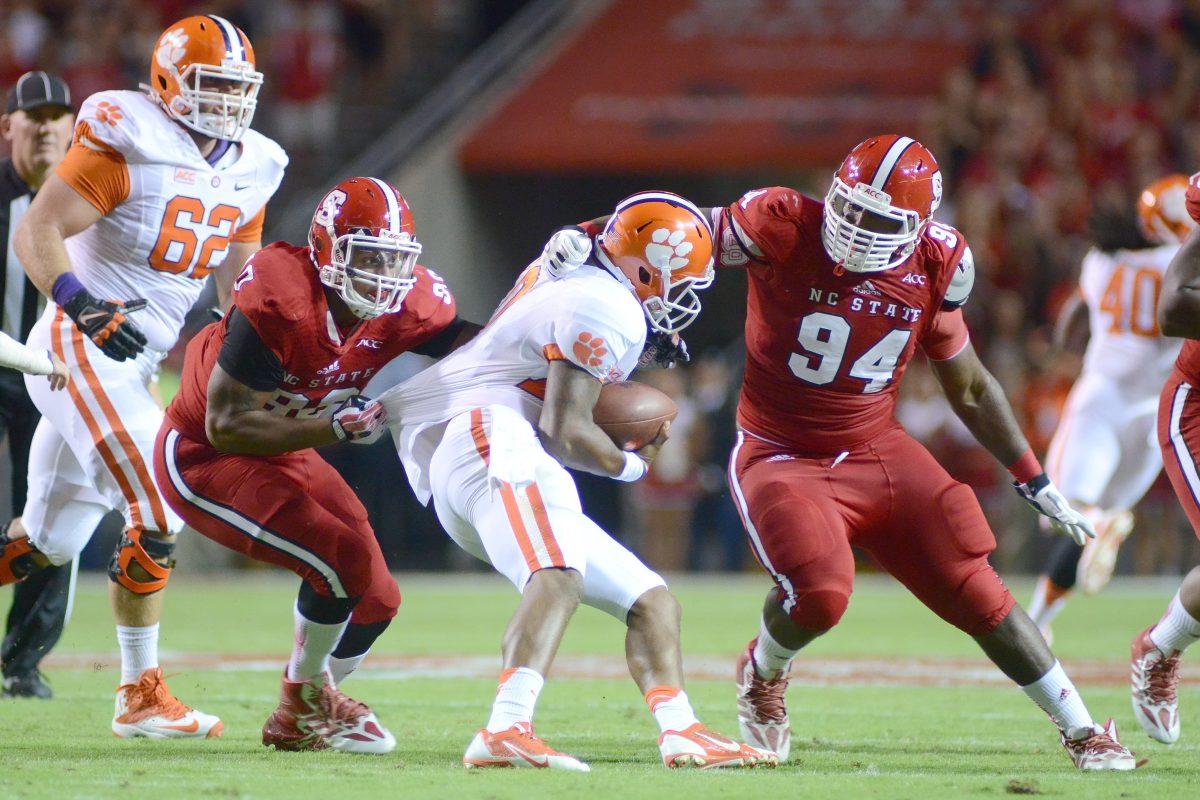
Redshirt sophomore defensive end Mike Rose and freshman defensive tackle Monty Nelson sack Clemson's quarterback Thursday, September 19, 2013. The Tigers led the Wolfpack 13-7 at the half at Carter-Finley Stadium. Photo by Ryan Parry.
The dust has finally settled from N.C. State football team’s 26-14 loss to No. 3 Clemson last Thursday night.
Much has been made of the whistle that blew dead a touchdown run by junior wide receiver Bryan Underwood. The official judged ruled that as Underwood was running along the sideline, he had stepped out of bounds, and thus whistled the play dead before Underwood reached the end zone.
Wolfpack fans were confused because as the junior sped into the end zone, a sideline official signaled a touchdown. But by rule, a play that has been blown dead cannot be reviewed.
Thus, Underwood’s potential momentum-changing 83-yard score was changed into a 1st-and-10 from the Clemson 47-yard line.
Pending the extra point, the touchdown would have given the Pack a 14-13 lead midway through the third quarter. State also would have gained momentum coming into a crucial stretch of the game.
Following the game, numerous social media posts condemned the officiating crew, a recurring theme among Wolfpack fans after losses. Head coach Dave Doeren, who was standing near Underwood as he ran along the sideline, said after the game that he did not see Underwood step out of bounds.
After the game, both Doeren and Underwood admirably refrained from outwardly criticizing the officials.
Was it a bad ruling? Yes. Was it a momentum shifter? Absolutely. But was it the reason the Pack lost the game? No.
After all, it wasn’t the officials’ fault that redshirt junior quarterback Pete Thomas fumbled three plays later and Clemson recovered the ball, or that the Tigers scored a touchdown moments after recovering the fumble.
Officials make mistakes just like players do. But you have to move on and keep playing.
As a matter of fact, it’s difficult to point to one single aspect of the game that led to State’s loss. The Tigers were certainly the better team on both sides of the ball. On offense, Clemson exhausted the Wolfpack’s defense. The Tigers had 415 yards of total offense and were 10-of-19 on third down opportunities.
State’s defense performed courageously throughout the contest, holding back the Tigers’ offensive juggernaut for as long as it could and giving its offense a chance to gain the lead. But eventually, Clemson broke through the Pack’s staunch resistance and put the game out of reach.
Quarterback Tajh Boyd, Clemson’s Heisman Trophy candidate, exorcised the demons from his first visit to Raleigh, throwing for 244 yards and three touchdowns. On defense, Clemson sacked Thomas five times and forced a pair of turnovers. State forced none.
Clemson is ranked No. 3 in the nation for a reason. They came out and showed that, plain and simple. State just couldn’t match its firepower.
The Wolfpack finished 3-for-16 on third down, which is alarming for two reasons.
First, you’re not going to score touchdowns if you can’t convert third downs to sustain drives. And second, if your team was pushed to third down 16 times, your offense probably isn’t playing very well.
By comparison, the Pack converted 8-of-16 against Richmond on Sept. 7 and 9-of-18 in the season opener against Louisiana Tech. In both games State’s offense arguably did not play well, but in those games the Pack at least managed a 50 percent conversion percentage.
Sure, Clemson was the toughest opponent State has faced this season, but a 19 percent conversion rate on third down is unacceptable.
The Pack committed a lot of penalties against the Tigers.
State was flagged nine times for 57 yards. This doesn’t sound like a lot of distance, but many of those flags were pre-snap penalties that killed drives.
In total, the Pack committed five false starts, far too many, especially for a home game. This reinforces another basic rule of offensive football: You’re not going to sustain drives if you commit penalties.
But none of that matters anymore. What’s done is done. The Wolfpack must forget this game and move forward. State now needs to worry about Central Michigan, which visits Carter-Finley Stadium at 3:30 p.m. on Saturday.